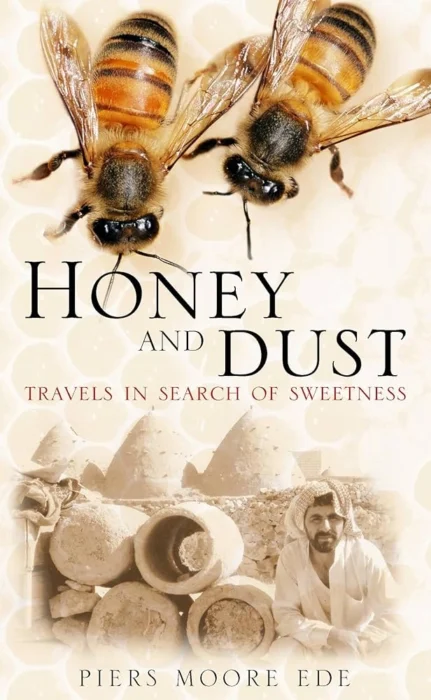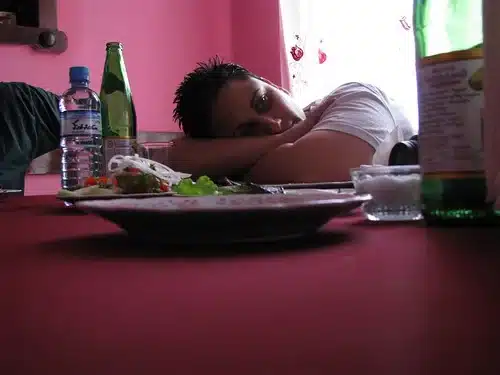For English review, please scroll down.
פִּירס מור־אֵידֶה יוצא למסע בעקבות דבורים ודבש, אבל זו רק המסכה של חיפוש עמוק יותר: ניסיון לרפא את עצמו אחרי תאונת דרכים קשה שהותירה אותו מרוסק בגוף ובנפש. הוא מגלה שהעיסוק בכוורות ובדבש מרגיע אותו, שיש משהו כמעט מדיטטיבי במלאכה הזאת, אבל הוא איננו כוורן. הוא צופה מבחוץ, מתקרב, נזהר מהעקיצה ובכל מקום שאליו הוא מגיע, זו גם המטאפורה וגם הבעיה.
הוא לא שייך. הוא לא בן המקום, לא חלק מהשדה, לא איש עמל אלא מתבונן. העובדה שהוא מערבי, אנגלי־אמריקאי, מלווה אותו כמו צל ומעמיקה את החשדנות כלפיו. במזרח התיכון החשדנות הזו מוחשית: הוא הזר שמגיע “לחפש משמעות” בזמן שאחרים נאבקים פשוט לשרוד.
בלבנון הוא פוגש דבוראים הרואים בדבש שארית מיתית של תקופה שבה האדם חי בהרמוניה עם האדמה. הם עובדים במדרונות הרי הלבנון, מתמודדים עם מלחמות, מיעוט משאבים וחום בלתי נסבל. מעטים ממשיכים לייצר דבש כמעשה אמונה.
בסוריה המצב קשה אף יותר. אחד המפגשים החזקים הוא עם דבוראי במדבר: המחבר נוסע לפאתי השממה רק כדי לראות כוורת שרוב הדבורים מתות בה. במקום למצוא שלווה, הוא נחשף לעוני, לבידוד ולשבריריות של האנושיות. הדבש כאן איננו סמל של שפע אלא של הישרדות.
בנקודה הזו נופל האסימון הראשון: זה איננו מסע של הארה, אלא של התפכחות. הבנה כמה עמוק הפער בין רעב נפשי של אדם שבע לבין רעב פיזי של מי שאין לו. הדבש, במזרח התיכון, איננו סמל של מתיקות אלא של מאבק.
בניו יורק הוא מגלה הפתעה: דווקא בלב הציוויליזציה הרעילה הוא פוגש כוורן עירוני שמספר לו שהדבש בעיר נקי יותר מזה שבכפרים. אין חומרי הדברה, אין גידולים מתועשים. העיר, במובנים מסוימים, טהורה יותר מהטבע. זה רגע שבו מור־אֵידֶה מבין שהחיפוש אחר טוהר הוא אשליה מערבית: העולם איננו מחולק בין טבע מקודש לתרבות מושחתת, אלא בין מי שמקשיב למקומו לבין מי שמנסה לברוח ממנו.
בפרקים של נפאל, כשהוא מצטרף לאיסוף הדבש ההזייתי של ההימלאיה, החיפוש הרוחני שלו הופך כמעט לגופני. הוא רואה אנשים מסתכנים בחייהם כדי לגעת במתיקות רגעית, ומבין שהעוקץ הוא חלק מהתשוקה, אולי מהחיים עצמם. הכאב איננו אויב אלא חומר הגלם של המשמעות.
בסרי לנקה ובהודו, כשהוא כבר כמעט מפוכח, הוא מתבונן בעולם שבו הרוחניות עצמה הפכה למוצר. מקדשים, טקסים, תיירים – כל מה שחשב שיוביל לשלווה נראה כמו תעשיית מתיקות מדוללת. ורק במפגש עם דבוראי מקומי הוא שומע משפט שמפרק את כל מה שחשב שהוא יודע:
“They say that if we show no fear, then [the bees] will not see us as enemies.
We do not need smoke for a nest like this.
Even when we are stung, since we do not consider it poison, we do not consider it pain.”
באותו רגע הוא מבין שהדבש מעולם לא היה היעד. העוקץ הוא חלק מהמתיקות, והכאב איננו רעל אלא עדות לקשר החי בין האדם לעולם.
בהודו הוא משתתף בקורס ויפאסנה במדראס. עשר יממות של שתיקה, כאב ומשמעת עצמית. שם הוא לומד את השיעור היחיד שהמסע באמת העניק לו:
“The nature of all sensations is that as they arise, so they pass away.”
לא הארה, אלא השלמה.
באפילוג הוא כותב על רצונו לגדל כוורות בעצמו, למצוא פינה קטנה שבה הדבורים והאדם יכולים לחיות יחד לא כסמל אלא כמציאות. שם, בין הפרחים שישתול, אולי תימצא סוף־סוף המתיקות שחיפש כל הדרך.
מור־אֵידֶה מתחיל את הספר כאדם שמבקש להירפא, ומסיים אותו כאדם שמבין שאין ריפוי בלי כאב, ואין מתיקות בלי עמל.
אבל זו גם הסיבה שחלק מהקוראים מאוכזבים: Honey and Dust איננו באמת ספר על דבורים. הן נוכחות בו כצל, כאלגוריה, אך תמיד בשוליים. הספר מתעניין פחות בחריצותן של הדבורים ויותר בשאלת מקומו של אדם מערבי בתוך עולם שנשבר.
מור־אֵידֶה אינו מתעד את חיי הדבורים אלא משתמש בהן כראי כדי לחשוף את הפער בין הרעיון הרומנטי של “טבע מרפא” לבין המציאות שבה גם הדבש, כמו האדם, נאלץ לשרוד.
זהו ספר על חיפוש שאיבד את מושא החיפוש, על אדם שהלך בעקבות הדבורים וגילה שבסופו של דבר הוא נמשך לא פחות לעוקץ מאשר למתיקות.
Honey and Dust: Travels in Search of Sweetness/ Piers Moore Ede
Bloomsbury, 2006, 304 Pp
דירוג SIVI –
איכות אודיו –

Piers Moore Ede embarks on a journey in search of bees and honey, but that quest is merely a disguise for something more profound: an attempt to heal himself after a car accident that left him broken in body and spirit. He discovers that beekeeping has a meditative rhythm, yet he is not a beekeeper. He is an outsider, observing from a distance, cautious, drawn close yet wary of the sting, and that, in every place he visits, becomes both the metaphor and the problem.
He doesn’t belong. He is not of the land, not a man of labor but of observation. His Western identity follows him like a shadow, deepening the distrust that surrounds him. In the Middle East, that distrust becomes palpable: he is the outsider who comes seeking “meaning” while others struggle to survive.
In Lebanon, he meets beekeepers who view honey as a mystical remnant of a time when humans lived in harmony with the earth. They work on sunburned slopes, battling war, scarcity, and relentless heat. Only a few continue to make honey as an act of faith.
Syria is harsher still. One of the book’s most decisive moments comes when he travels to the edge of the desert to visit a beekeeper whose hive lies half-dead. Instead of serenity, he finds poverty, isolation, and the fragility of human life. Here, honey is not a symbol of abundance but of survival.
This is the first real revelation: the recognition of the gulf between the spiritual hunger of a privileged man and the physical hunger of those who have nothing. In the Middle East, honey does not represent sweetness; it represents endurance.
In New York, he encounters another paradox. On the rooftops of the city, he meets an urban beekeeper who tells him that the honey here is purer than in the countryside: there are no pesticides, no industrial crops. The city, in its own strange way, is cleaner than nature. Moore Ede begins to see that the Western idea of “purity” is a mirage; the world is not divided between sacred nature and corrupt civilization, but between those who listen to where they are and those who keep fleeing from it.
In Nepal, as he joins the perilous harvest of hallucinogenic honey in the Himalayas, his spiritual journey becomes physical. Watching men risk their lives for a moment of sweetness, he understands that the sting is part of desire, perhaps part of life itself. Pain, he realizes, is not an enemy but the raw material of meaning.
By the time he reaches Sri Lanka and India, disillusionment has set in. Spirituality has become another commodity: temples, rituals, pilgrims, all the sweetness of faith, watered down. Then, during a conversation with a local beekeeper, he hears the sentence that undoes everything he thought he knew:
“They say that if we show no fear, then [the bees] will not see us as enemies.
We do not need smoke for a nest like this.
Even when we are stung, since we do not consider it poison, we do not consider it pain.”
In that moment, he understands that honey was never the goal. The sting is part of the sweetness, and pain is not poison but proof of connection; a living exchange between man and the world.
In India, he takes a Vipassana course near Madras, a ten-day course of silence, pain, and surrender. There, he learns the only lesson the journey truly offers:
“The nature of all sensations is that as they arise, so they pass away.”
Not enlightenment, but acceptance.
In the epilogue, he writes of wanting to keep his own hives someday, to find a small corner where bees and humans can coexist not as a symbol, but as a way of life itself. Among those flowers, he might finally see the sweetness he has been seeking all along.
Moore Ede begins the book as a man desperate for healing, and ends it as one who knows that there is no healing without pain, no sweetness without labor.
But this is also why many readers feel misled: Honey and Dust is not truly a book about bees. They linger at the margins, steady, diligent, indifferent to his searching. The book is about the man who looked to them for salvation and found, instead, a quiet truth: that the world stings, and that’s precisely why it’s alive.
לגלות עוד מהאתר Sivi's Books
Subscribe to get the latest posts sent to your email.

